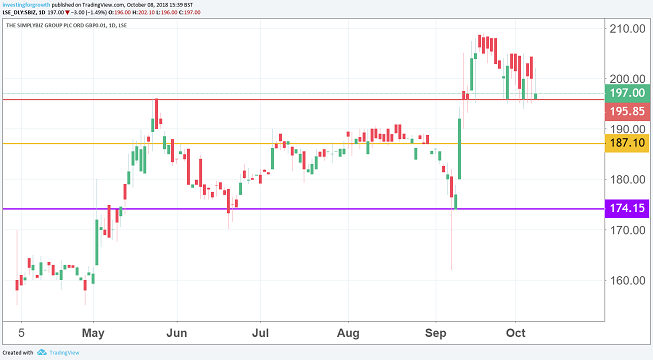Stockwatch: An AIM newbie for the long term
9th October 2018 09:19
by Edmond Jackson from interactive investor
Boasting a seam of quality earnings, companies analyst Edmond Jackson believes shares in this recent IPO could sail onwards and upwards on the tailwind of financial regulation.

Last week I expressed concern about the durability of demand for investment funds, should financial sentiment change, which would lower asset managers' earnings due to their operational gearing. A less risky alternative linked to consumer financial services – which ought to have good long-term prospects as more people seek advice – is a £153 million AIM company that floated in April, recently declaring sound progress.
SimplyBiz Group was founded in 2002, shortly before the Financial Services Authority (FSA) came into being - direct authorisation making it easier for capable financial advisers to set up their own firm than work as representatives of large networks.
Together with life's complexities boosting the need for advice, the FSA's successor - the Financial Conduct Authority (FCA) – has cited the number of UK firms providing it, rising well over 5,000. A dilemma for them is meeting regulatory needs without the cost of hiring a compliance officer, which has enabled SimplyBiz to build a strong leadership in support services.
Revenues involve compliance and marketing services
Half of the group's £44.1 million 2017 revenues came from "intermediary services" – a monthly subscription service to maintain compliance with regulatory requirements, enabling IFA firms to focus on advice. Scope extended to mortgage advisers and consumer credit brokers when these came under FCA regulation in 2005 and 2014 respectively.
There's a strong element of "essential service" here, given it doesn't make much sense for IFA firms to hire a dedicated compliance officer. Interim group results show the number of member firms up 5.7% to 3,628 in the first half of 2018, with "SimplyBiz strategically well placed to support and guide them through FCA registration and assist in a constantly evolving and increasingly complex regulatory environment".
A financial planning system "Centra", launched last March, has notched up over 1,600 users, although Zest Technologies, an employee benefits software solution, saw revenues slip 24% like-for-like in the first half-year "as customers move away from the legacy application". This month, the latest one was selected by Benni, a new workplace benefits service, offering "a high-quality employee experience whilst reducing the administrative burden".
• AIM's five best and worst stocks in Q3
• Buy, hold, sell: Three small-caps to own or ditch
The other side of the group - "distribution channels" - enables some 135 product providers among them asset managers, life assurance and pension companies, mortgage and insurance providers, to reach the group's financial intermediary members e.g. via annual contracts. Income from such agreements jumped 20.9% to £3 million in the first half, albeit partly due to service delivery timing.
Altogether, over the last five years group revenue has expanded 151%, with the intermediary membership base up around 55% - affirming how regulation is a useful tailwind. Management has responded to various landmark developments like the introduction of auto-enrolment pensions, regulation of consumer credit, the mortgage market review and MiFID II.
£26.3 million raised in April, slashed net debt
Some £35million of debt was taking over a third of operating profit in costs. Instead, and as at end-June - with a new £15 million revolving credit facility "at a significantly lower interest rate" – there was £10.7 million unrestricted cash and £10 million debt, which should improve the income statement going forward and boost corporate development.
Maiden results as a listed company are attractive: interim group revenue up 13.7%, the normalised operating margin up from 20.7% to 22.2%, enabling adjusted profit/earningsper share (EPS) measures to advance over 60%.
Statutory results were "loss-making" in that £22.9 million operating expenses (inclusive of flotation costs) and £2.5 million net finance costs, meant a £1.2 million statutory loss, although the tax charge rising near £0.6 million affirms improving underlying profit.
Operating cash conversion did reduce from 84% to 65% year-on-year due to above-average working capital balances, hence a slight reduction in operating cash flow to £3.5 million.

Source: TradingView (*) Past performance is not a guide to future performance
Management says cash conversion should improve over 75% in line with previous rates in the second half of 2018, part-explaining a 0.98p interim dividend (with payout flexibility also enhanced by the capital-raising). Mind, this dividend was said in respect of nine months trading to end-2018, as if to caution against a read-over to H2, which implies a scant dividend yield on a share price of 200p.
Moreover, intangible assets constitute 102.4% of net assets, so perception of value will focus on the earnings trend, making for a volatile stock should it falter any time.
| SimplyBiz Group - profit and loss summary | |||||
|---|---|---|---|---|---|
| Year ended 31 Dec | 2015 | 2016 | 2017 | ||
| Revenue | 38,480 | 40,815 | 44,066 | ||
| Operating expenses | -30,929 | -32,492 | 34,921 | ||
| Operating profit pre-exceptionals | 7,551 | 8,323 | 9,145 | ||
| Operating margin | 19.6% | 20.4% | 20.80% | ||
| Exceptional items | -6,081 | -66 | -342 | ||
| Operating profit | 1,470 | 8,257 | 8,803 | ||
| Net finance costs | -1,992 | -3,316 | -3,322 | ||
| Pre-tax profit | -522 | 4,941 | 5,481 | ||
| Taxation | -151 | -864 | -694 | ||
| Post-tax profit | -673 | 4,077 | 4,787 |
Source: Admission Document, March 2018
Wider business cycle risk looks the key one
Given the "essential" nature of SimplyBiz's intermediary services, linked chiefly to regulation, risk on this side of the business relates more to an economic jolt serious enough to halt start-ups.
Controversy over direct benefit pension transfers may lead to regulatory change that disrupts the advice industry, if more likely to support SimplyBiz. The "marketing services" flavour of the group's distribution channels side looks relatively more exposed to a weaker UK economy as firms and individuals hunker down, possibly leading to lower levels of financial transactions.
The January 2018 acquisition of a surveying company, said to be "highly aligned and complementary" to an existing group surveyor, appointed by the majority of UK bank/building society panels, looks a sensible integration, if unlikely to buttress the group's service revenues if the housing market slows further amid financial uncertainty.
This is relevant in terms of whether a growth rating – presently about 20 times likely 2018 earnings – is justified, also in respect of perceived earnings quality, or whether in due course SimplyBiz will be affected by any wider downturn.
Management has part cashed-in, yet retains strong equity
Note 6 in the prospectus on page 101 shows Ken Davy, the founder (currently non-executive chairman) reducing his interest from 33.4 million to 30.5 million shares – 39.9% of the enlarged equity following the placing. The joint CEO's halved their stakes to about 2% each, although one has since added 100,000 shares at 188.5p for his SIPP – presumably in part for the income tax benefits – taking his holding to 1,661,975 shares.
Both the joint CEO's are aged around 40 years versus the chairman at 74, hence it is positive that they're retaining sizable equity. Further down note 6 on page 105, Davy's daughters have sold over 14 million shares, accounting for most of their interests, albeit retaining about 2 million each.
Despite the insiders' selling, however, collectively they control about 62% of the business which could be seen as excessive anyway - certainly for a publicly listed company - but it is a motivator for generating sustainable long-term value.
At around 200p, the stock appears fairly priced, yet in the current highly challenging environment for stock-pickers it has merits as a tuck-away.
A cynic might say its flotation was well-timed to cut/revamp debt before interest rates rise, and for insiders to take some profits lest UK economic downturn undermines various services. But taking a long view, SimplyBiz could end up a useful bolt-on for a support services group seeking better quality earnings - consider how Capita (CPI) has come to dominate a lot of shareholder services nowadays.
If the stock's earnings were to falter at some point ahead, and the loss of growth rating triggering a sharp drop, it could create a takeover situation. You could watch and wait, but SimplyBiz may continue to sail onwards and upwards on the tailwind of financial regulation. So, despite an aspect of cyclical risk, the shares rates a Long-Term Buy.
*Horizontal lines on charts represent previous technical support and resistance.
Edmond Jackson is a freelance contributor and not a direct employee of interactive investor.
These articles are provided for information purposes only. Occasionally, an opinion about whether to buy or sell a specific investment may be provided by third parties. The content is not intended to be a personal recommendation to buy or sell any financial instrument or product, or to adopt any investment strategy as it is not provided based on an assessment of your investing knowledge and experience, your financial situation or your investment objectives. The value of your investments, and the income derived from them, may go down as well as up. You may not get back all the money that you invest. The investments referred to in this article may not be suitable for all investors, and if in doubt, an investor should seek advice from a qualified investment adviser.
Full performance can be found on the company or index summary page on the interactive investor website. Simply click on the company's or index name highlighted in the article.
Disclosure
We use a combination of fundamental and technical analysis in forming our view as to the valuation and prospects of an investment. Where relevant we have set out those particular matters we think are important in the above article, but further detail can be found here.
Please note that our article on this investment should not be considered to be a regular publication.
Details of all recommendations issued by ii during the previous 12-month period can be found here.
ii adheres to a strict code of conduct. Contributors may hold shares or have other interests in companies included in these portfolios, which could create a conflict of interests. Contributors intending to write about any financial instruments in which they have an interest are required to disclose such interest to ii and in the article itself. ii will at all times consider whether such interest impairs the objectivity of the recommendation.
In addition, individuals involved in the production of investment articles are subject to a personal account dealing restriction, which prevents them from placing a transaction in the specified instrument(s) for a period before and for five working days after such publication. This is to avoid personal interests conflicting with the interests of the recipients of those investment articles.